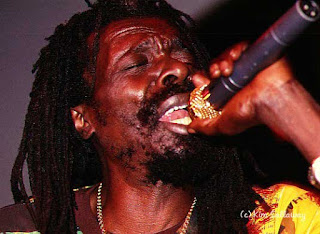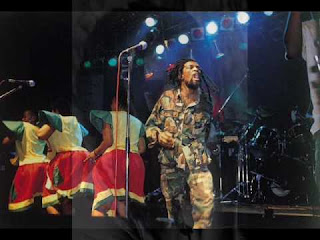
Joel Savage interviews Joseph Hill, the lead singer of the group Culture
POLE-POLE FESTIVAL-GENT- BELGIUM (2004) BY JOEL SAVAGE
Down in Jamaica, where Garvey comes from, many groups and musicians started in the early seventies, as the mighty Joseph Hill of Culture. But they are nowhere to be found today.
Like the spirit of the Lord upon Joseph Hill, for the past 30 years, nothing at all could stop him from spreading his message against war, oppression, crime, discrimination, poverty, racism, corruption and injustice.
Last year, 2003, he came out with "World Peace" seeking peace worldwide and rejecting war totally through music. On July 25, 2004, after performing live, he granted this interview to "The Voice Magazine" Belgian correspondent. Joel Savage.
TV: I have to call you Sir Joseph Hill. Let's rally round Jehovah's throne, I have some few questions to ask you today.
Joseph: You are welcome. (Then he smiled)
TV: It was in the seventies I heard of Culture. Can you please tell me what has inspired you to be in this hard music industry for all these years?
Joseph: It's Jah (referring to God) that gives me the strength. Always feel that there is something watching out for me. For myself, I love to play for the people. They are also part of my inspiration. That's what has inspired me through all these years.
TV: You have been singing all your life about corruption, oppression, discrimination, war, poverty, and so on. Were you a victim of such things in any circumstances?
Joseph: There are people I saw in comparison to various countries. Yes! Yes!! Yes!!! I have seen those things through political reasons. I have seen people die and not a word of justice is been said.
Think of the person's life. It is priceless. The last grief I had was this woman in Afghanistan, who is separated from her land. They treated her so bad that she and her sixteen-year-old child were eating grass. That was my last grief. (Joseph moved with sorrow spelled the word grass "G R A S S" grass)
TV: Your lyrics and beats in every song of "Culture" touches and moves everyone on the road of trials and tribulations. Where do you get such wonderful rhythms and lyrics from?
Joseph: The big man that rules the earth. (He laughed) He is the governor.
TV: You were in Sierra Leone on two occasions, when the war was at its peak, with brutal activities of the rebels. Did your visit create any impact or change your view on the suffering masses in the country?
Joseph: Yes my visit brought a change. When people saw me, they didn't know what to say. They just cried and cried. You know, the rebels told the government that "You should be glad Joseph is here. If he wasn't here, this place would be destroyed within 24 hours. I just came back from there a few weeks ago.
Joel: I learned that in the capital Freetown, at the guest house you lodged, there is a tree nearby and every morning a bird came to sing, and out of the song of the bird, you composed a song from it. Is it true?
Joseph: Yes it's true.
Joel: On July 4th, 2004, I interviewed Lucky Dube, he told me that as a friend, you are one of the best men in the music industry. How do you react to this nice compliment?
Joseph: I take it easy. That's it.
Joel: I ask the same question to any reggae artist I interview. Reggae music is loved by everyone. But why is it that the music is given less recognition?
Joseph: Because the truth is God's friend but not a lot of people are friends of the truth.
Joel: You are following the Palestinian and the Israeli conflict for a very long time, and you have even visited the Gaza Strip. Who do you think is the stumbling block to the peace everyone is seeking?
Joseph: Greed, greed and greed because there is enough to satisfy every man's need but never enough to satisfy no man's greed. So greed is the stumbling block.
Joel: In one of your music, you played a song against Yasser Arafat, as the stumbling block.
Reggae interviews
Joseph: He made himself like that. He has to change his ways
and the other man would change his ways. There is something called
“Repentance”. When repentance meets their hearts, we shall have a beautiful
world.
Joel: You
successfully came out last year with the remarkable “world peace” album. What
message do you still have in mind for your numerous fans worldwide?
Joseph: You know people should respect one another. To be
used, abused, refused and our hearts trampled by fear and living in doubt,
thinking we are living on top of the world. No, we shouldn’t live that way. We
have to seek happiness, love, mutual respect, joy and justice of God around us,
and peace would find its rightful place.
Joel: Thank you very
much for this interview Sir Joseph Hill.
Joseph: Thanks be to Jah
Read other interviews of Anthony B, Andrew Tosh, U-Roy,
Prince Malachi, Julian Marley, ASWAD, Femi Kuti, Seun Kuti, Tutu Puoane and
many others in ‘The Passion of Reggae and African Music.
http://www.amazon.com/Passion-Reggae-African-Music-ebook/dp/B013L9A1JQ






